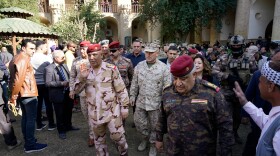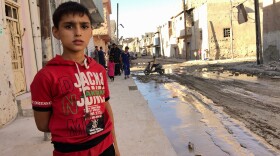
Jane Arraf
Jane Arraf covers Egypt, Iraq, and other parts of the Middle East for NPR News.
Arraf joined NPR in 2017 after two decades of reporting from and about the region for CNN, NBC, the Christian Science Monitor, PBS Newshour, and Al Jazeera English. She has previously been posted to Baghdad, Amman, and Istanbul, along with Washington, DC, New York, and Montreal.
She has reported from Iraq since the 1990s. For several years, Arraf was the only Western journalist based in Baghdad. She reported on the war in Iraq in 2003 and covered live the battles for Fallujah, Najaf, Samarra, and Tel Afar. She has also covered India, Pakistan, Haiti, Bosnia, and Afghanistan and has done extensive magazine writing.
Arraf is a former Edward R. Murrow press fellow at the Council on Foreign Relations in New York. Her awards include a Peabody for PBSNewsHour, an Overseas Press Club citation, and inclusion in a CNN Emmy.
Arraf studied journalism at Carleton University in Ottawa and began her career at Reuters.
-
In a country at war and already seeing widespread malnutrition, Yemen's troubles are compounded by the threat of the coronavirus.
-
Five years of fighting has left the country in ruins. "We are bracing for the worst," a U.N. official said. The country is already dealing with war, poverty and malnutrition.
-
The virus is upending burial traditions across cultures, from the washing of the body of a loved one in Iraq to the gathering of mourners in Israel.
-
The elaborate funeral pyres of India, the seven-day mourning among Jews in Israel and the sacred body washing of Muslims in Iraq, are all important rituals of death now in disarray amid the pandemic.
-
The Middle Eastern kingdom says 26 people tested positive for the virus after the large gathering, reportedly including a guest who flew in from Canada.
-
The Middle Eastern kingdom has forced most people to stay indoors, banned driving and even temporarily shut down grocery stores and pharmacies.
-
NPR international correspondent Jane Arraf and freelance photographer Alexander Tahaov were among journalists invited to tour the Ain al-Assad air base, which houses some 1,500 U.S. troops.
-
For the first time in years, an American military general walked the streets of Baghdad. Some Iraqis seemed to ignore it, while others decried it as a violation of national sovereignty.
-
U.S.-backed Iraqi forces drove the militants out of the city eight months ago, but residents say hardly any efforts are in place to rebuild homes after airstrikes and explosions toppled them.
-
Three months after ISIS was pushed out of Mosul, the eastern half of the Iraqi city is bustling and growing. But the badly damaged western half is in ruins, and its residents are angry and resentful.








